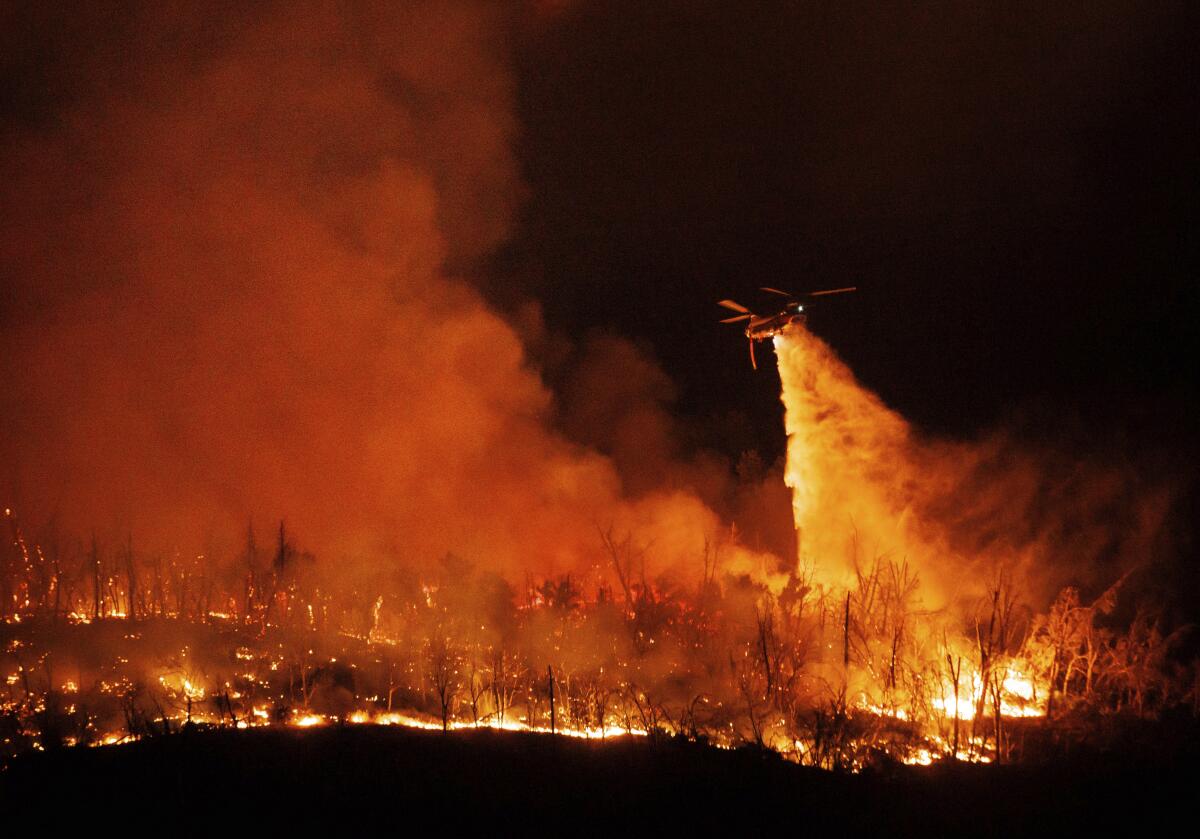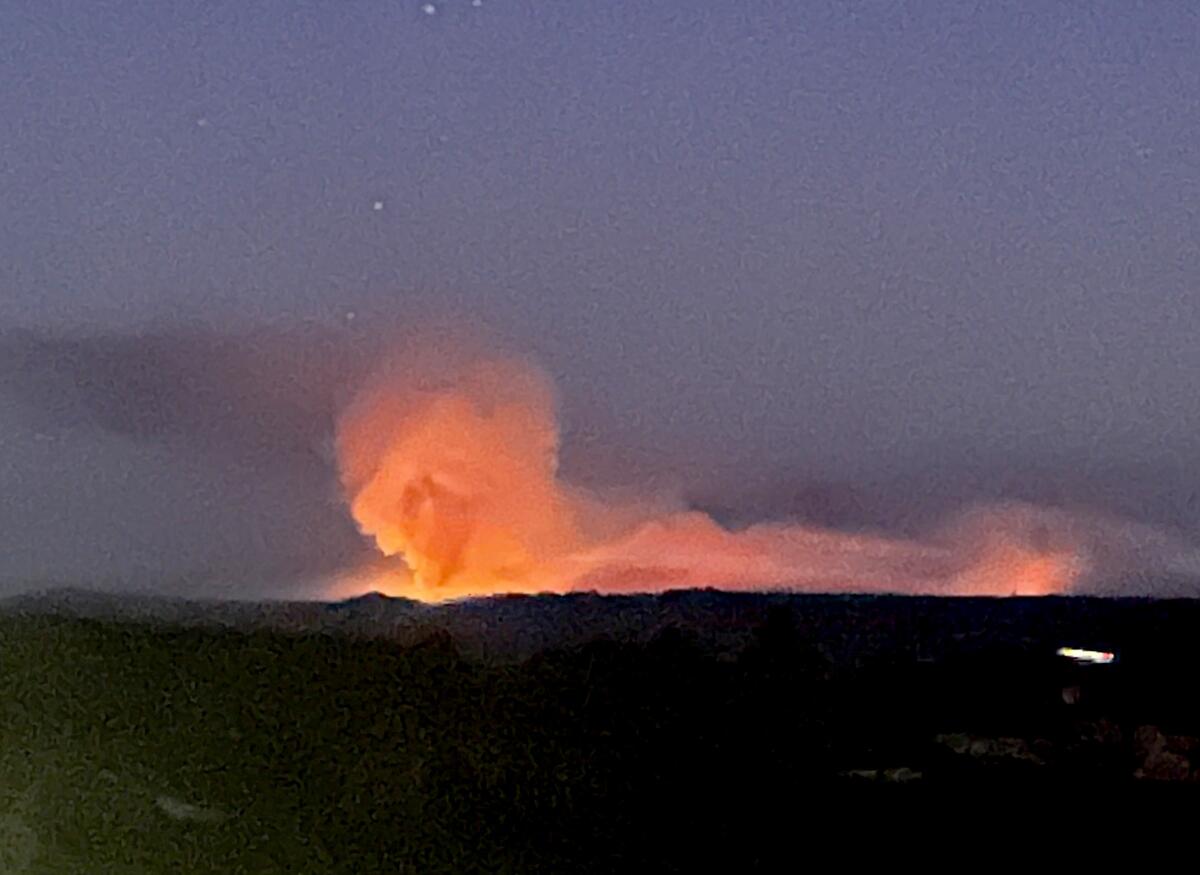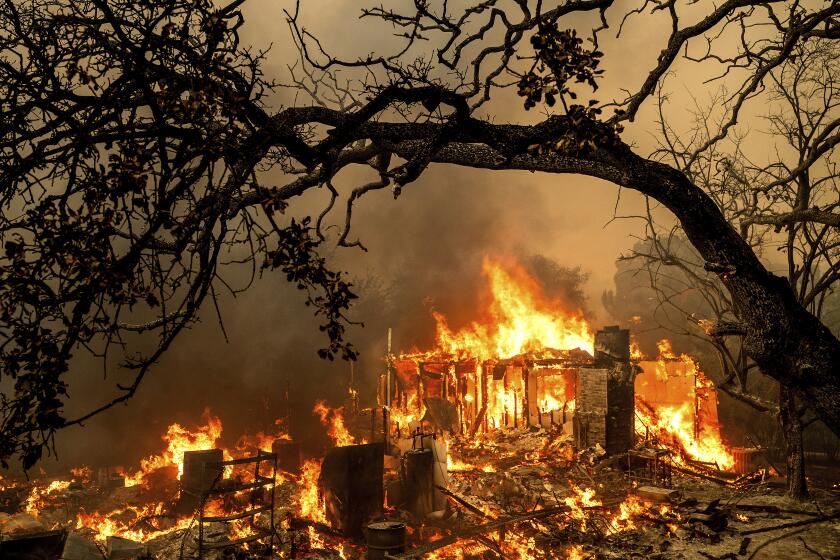Thompson fire conjures traumatic memories for Camp fire survivor who lost everything but her life

Ria Abernathy was driving home from her son’s place in Oroville on Tuesday evening when an ominous scene unfolded before her. Billowing up from the horizon was a massive plume of neon-orange smoke.
The 55-year-old appliance service manager stopped to snap a picture of the Thompson fire, which would burn more than 3,500 acres of dry grass and brush near the Northern California town by the following night and spur an evacuation order for thousands of residents.
The flames did not appear likely to make it to Abernathy’s home, some 25 minutes away in the Butte County community of Magalia. But the image was eerily similar to what she saw one morning in November 2018, just before she fled her Paradise home amid the Camp fire. That blaze would go on to kill 85 people and destroy everything Abernathy owned.

“It brings up a lot of bad — even a little PTSD — memories, for sure,” she said of the most recent fire.
Butte County has been buffeted by disaster after disaster in recent years — the Oroville Dam spillway failure that spurred the evacuation of 180,000 people in 2017; the massive North Complex fire, which killed 16 people in 2020; the even-more massive Dixie fire, which scorched much of the county in 2021, becoming the first to burn from one side of the Sierra Nevada to the other. But perhaps no event is more deeply ingrained in the region’s psyche than the Camp fire, which remains California’s deadliest wildfire to date and left wounds that have been slow to heal.
“I think it’s really important for people to know that with the fire — the original fire — people are still struggling,” Abernathy said. “I lost my whole history. So many people lost their history, and it’s not coming back.”
Abernathy moved to Butte County from Southern California when her oldest, now 39, was 5 years old. She wanted a better life for her children and was drawn by the mountain views, abundant wildlife and friendly people.
She knew that wildfires were a risk, thanks to the recurrent droughts, dense stands of trees and winding canyons. A week or two before the Camp fire, she’d been warned she might have to evacuate from a different fire, so she’d packed her car and was ready to go. About four days before the Camp fire, she’d unloaded it all, thinking she was in the clear. By the time the flames neared her doorstep, she was out of time.
“I just dropped everything and said, ‘OK, we’ll come back,’” she said. “We never got back.”
As California braces for a heat wave expected to last through next week, several wildfires have ignited under critical fire conditions, forcing evacuations.
An uninsured renter, Abernathy was first relocated to Corning, but says she lost that home due to a miscommunication with the Federal Emergency Management Agency. She wound up living in a trailer in a church parking lot for eight months.
She eventually received an $80,000 settlement from Pacific Gas & Electric Co., whose equipment sparked the Camp fire and which pleaded guilty to 84 counts of involuntary manslaughter in connection with the blaze. But after she paid taxes on the settlement and gave a third of it to her attorney, there wasn’t a whole lot left. Even less if you consider that her PG&E utility bill skyrocketed from $150 a month to $500 a month in the fire’s aftermath, she said.
“I’m pretty much getting squeezed out because I can’t afford to live here,” she said, adding that her landlord has had a hard time maintaining homeowner’s insurance on the property as insurers raise rates or flee the state altogether.
“I don’t know what I’m going to do because I take care of my mom who’s 84 and my grandson who’s 19. I don’t want to move from here — this is where my kids were all raised — but I can’t afford to be here anymore.”
Abernathy’s son and his wife recently bought a home in Oroville, closer to the Thompson fire. She’s hopeful they’ll have an easier time fleeing than she did from the Camp fire — if it comes to that. The town has multiple access points, unlike Paradise, which had few roads leading out of town.
The couple hadn’t yet been ordered to evacuate by Wednesday night. But Abernathy has already told them to pack their bags and pile them in the car, just in case.
More to Read
Sign up for Essential California
The most important California stories and recommendations in your inbox every morning.
You may occasionally receive promotional content from the Los Angeles Times.











